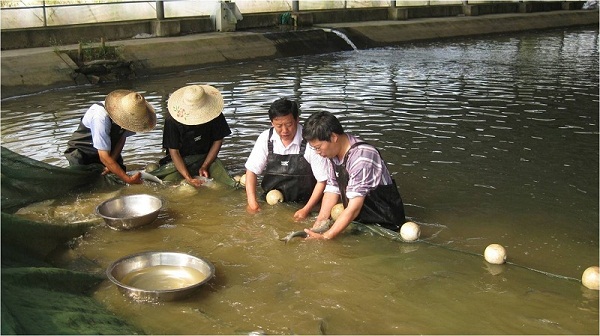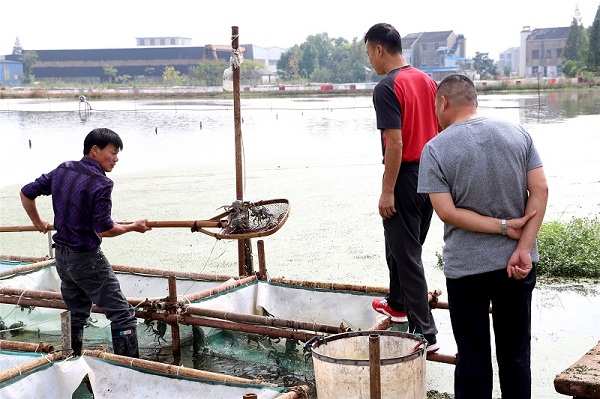
Zheng Jinliang (second from right) checks fish in his pond. [Photo/wxrb.com]
In Jiangyin, East China's Jiangsu province, people living near the Yangtze River regarded Asia's longest waterway as nothing but a source of food and income for hundreds of years.
As the central authorities attached increasingly greater importance to conservation of the Yangtze River, the main body of which flows for more than 6,300 kilometers, a 10-year fishing moratorium started to be phased in at the beginning of 2020.
The ban has barred fishermen from catching certain kinds of aquatic products since February, including crab, shrimp and fish, such as the long-tailed anchovy.
Many former fishermen have started new lives and are still adapting to the changes.
Zheng Jinliang, who is in his 70s, is known as the "globefish king" in Jiangyin for his years of efforts breeding specialties in the Yangtze, such as globefish, hilsa herring and long-tailed anchovy, which were regarded as the "three delicacies" in the river.
The Yangtze has long been suffering from human activities such as overfishing. Biological deterioration has also reduced fishing along the river.
With the help of the Freshwater Fisheries Research Center (FFRC) of the Chinese Academy of Fishery Sciences, Zhang discovered ways to breed the "three delicacies" and promoted them to many restaurants in Jiangsu and Shanghai.

Zheng Bingqing introduces aquatic products via livestreamings. [Photo/wxrb.com]
Zheng's granddaughter Zheng Bingqing was exposed to research work on aquatic products since childhood and now works at Zheng's aquatic farm and tries to promote aquatic products via livestreaming.
Like Zheng, Zhang Shengfeng, also a former fisherman, is earning his living by breeding local crabs. The sweet taste of Jiangyin crab makes them popular and they cost 10 yuan ($1.4) more than other crabs per kilogram, according to Zheng.

Some former fishermen in Jiangyin now breed crabs. [Photo/wxrb.com]
Locals in Weichang town, which is not far from Zheng's factory, are achieving prosperity through breeding and selling crabs. All the 150 families living there are breeding crabs now, with the total crab breeding area now exceeding 200 hectares.
"Most of the locals here were living by fishing," said Zhong Yuan, Party secretary of Weichang town. "We were glad to change to another way of living by securing a better life for the people living in the Yangtze River basin."